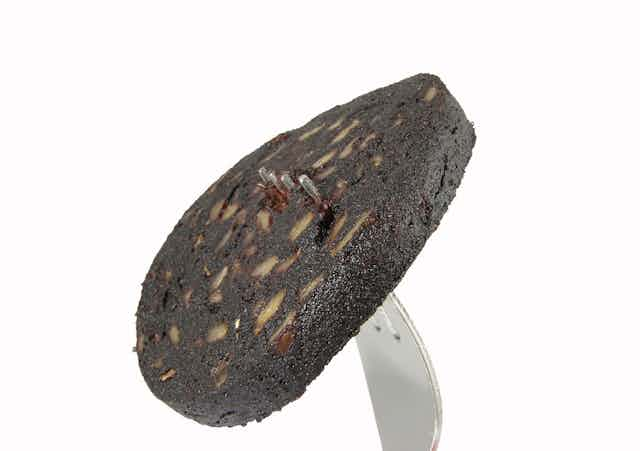Long a firm favourite in the cooked breakfast, black pudding has now apparently joined the likes of blueberries, quinoa and kale as a superfood. The mainstream media have picked up on a claim by online retailer Musclefood that black pudding, high in iron and protein and low in carbohydrates, is a healthy option – especially compared to its processed plate-mates bacon and sausages. But does black pudding really deserve the superfood accolade?
Blood puddings are eaten in various forms in many countries – morcilla in Spain or boudin noir in France, for example. One of the best known is the Stornoway black pudding from the Isle of Lewis, off the west coast of Scotland, where it originated as a means of avoiding food waste: crofters kept only small numbers of animals, so it was essential that when one was slaughtered, every part was used. Before the days of refrigeration, the blood was immediately mixed with fat, oatmeal and seasonings, and packed into a length of the animal’s intestine. This was then boiled and could be stored for a few weeks.

In more recent times, Hugh Fearnley-Whittingstall has extolled the virtues of eating offal. He thinks meat eaters “ought to eat all parts of an animal, not just the pretty bits”. But the key feature that led to black pudding being named as a superfood is the blood, which makes it a rich source of iron. A portion of two slices weighs around 60g-120g. From 100g you get around 12mg of iron, whereas the needs of most adult men would be met by 9mg a day.
Several population groups in the UK take in too little iron, but it is women of childbearing age, who need more than anyone else, who are particularly prone to deficiency.
Dietary iron comes in the form of “haem” from the blood and muscle in animal meats, which is well absorbed; and “non-haem”, mainly from plant foods, which is not so well absorbed. This helps to make black pudding a rich and easily absorbed source of iron for those in need of a boost, even if some of the “haem” iron is likely to be converted to “non-haem” in the cooking process.
Hold the second helping
Black pudding is also proposed to be a good source of other minerals, such as magnesium, zinc and calcium, as well as providing protein. Having said that, obtaining enough protein and minerals is not an issue for most healthy people in developed countries. Most of us actually consume at least one-and-a-half to twice as much protein as we require.
Then we come to the potential downsides, the first of which is the fat content. A low-fat food is usually considered to contain less than 3g of fat per 100g, while a high-fat food contains more than 17.5g. The black puddings made by different manufacturers span this range, with some containing less than 3g/100g and others up to 22g. Up to half of this fat is saturated, which has long been linked to heart disease – albeit some studies have raised doubts. It also means that the calorie content varies almost threefold, from 120kcal per 100g to more than 300kcal.
Another ingredient of note is salt, which has been linked with high blood pressure and heart disease. The UK’s public-health target is a maximum of 6g/day (a teaspoon), but it has been reported that intakes average around 8g, largely as a result of eating so many processed foods, which are high in salt. A high-salt food is classified as having more than 1.5g salt (or 0.6g sodium) per 100g – and black pudding has between 1.5g and 2.4g of salt per 100g.
Interestingly, there is work underway in Ireland to reduce the salt and fat content of black pudding. Initial testing suggested it was possible to produce a reduced-fat version containing only 0.6g salt (per 100g pudding) that still tasted acceptable.
But be that as it may, black pudding is also a processed meat. Like sausages and bacon, this means it is linked to bowel cancer. The exact cause is still being debated, but either the preservatives or the processes involved in smoking, curing or salting are thought to produce carcinogens. As such, the World Cancer Research Fund has suggested we should avoid these foods altogether.

In truth, black pudding is perhaps less “processed” than some other meat products. Yet it has another negative, which is unfortunately linked to its claim to superfood status: haem iron is thought to promote cancer by damaging the lining of the bowel, particularly in those with poor-quality diets who consume high quantities of meat.
If after weighing up the risks you decide to enjoy black pudding in moderation, there are still ways to limit the damage. Instead of serving it as an accompaniment to sausage and bacon, it could be grilled and added to a warm tomato salad or a barley risotto accompanied with seasonal greens. Alternatively you could avoid the haem and source a vegetarian black pudding – just don’t expect it to do as much to boost your iron stores.

